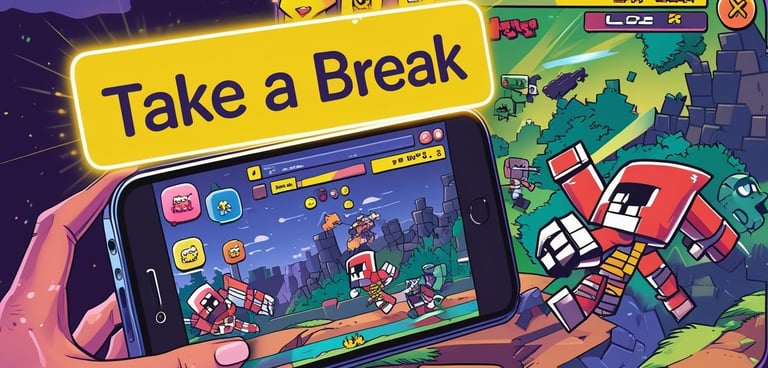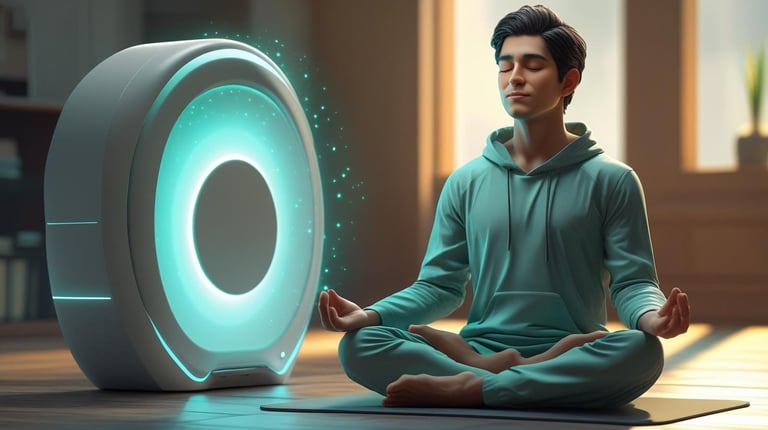Creative Solutions for Managing Cognitive Behavior in Gamers
Gaming Impact on Cognitive Behaviour. Part 2
Gajanan L. Bhonde
8/25/20258 min read


Introduction to Cognitive Behavior in Gaming
Cognitive behavior refers to the mental processes involved in perception, memory, judgment, and reasoning. In the context of gaming, cognitive behavior plays a crucial role in how players interact with games and the world around them. Games are designed to engage players both mentally and emotionally, often influencing their thought patterns and decision-making processes. Understanding these influences is essential for both gamers and those designing games, as cognitive behavior can significantly affect overall gaming experience and well-being.
One of the significant ways gaming impacts cognitive behavior is through skills such as problem-solving, strategic thinking, and multitasking. Many games require players to navigate complex environments, make quick decisions, and adapt their strategies based on changing circumstances. This engagement can lead to improved cognitive flexibility and enhanced memory capabilities. Players often find themselves analyzing scenarios critically and applying learned strategies to new challenges, which can foster stronger mental skills and creativity.
However, the implications of gaming on cognitive behavior are not universally positive. Excessive gaming can lead to negative consequences such as addiction, diminished attention spans, and increased impulsivity. These adverse effects may hinder an individual’s ability to engage in everyday activities, leading to challenges in academic or professional settings. The balance of gaming's positive and negative influences on cognitive behavior underlines the necessity for effective management strategies to optimize the gaming experience.
As we delve deeper into this topic, it is imperative to explore various strategies and solutions available for managing the cognitive impacts of gaming. By understanding both the beneficial and detrimental effects gaming can have on cognitive behavior, we can establish a framework for healthier gaming practices that promote mental well-being.
The Importance of Time Management Tools
Effective time management is crucial for gamers to ensure that their gaming habits do not interfere with daily responsibilities and overall well-being. In a world where digital entertainment is readily accessible, the challenge of finding the right balance between gaming and real-life obligations becomes paramount. To assist gamers in navigating this balancing act, various time management tools and techniques are available, designed specifically to address this unique need.
One of the most effective approaches is the use of applications that help monitor and limit gaming sessions. These applications can often track usage time and send reminders when it is time to take a break. For instance, apps like "StayFocused" or "Forest" not only help screen time management but also encourage users to set specific gaming limits. By utilizing these tools, gamers can create structured schedules that incorporate breaks, ensuring that gaming does not become an all-consuming activity.
Additionally, setting personal reminders can further aid in establishing healthy boundaries. Using calendar applications or simple alarm functions on smartphones, gamers can allocate specific time slots for gaming. This technique not only promotes disciplined gaming but also fosters the cultivation of other important activities such as exercise, hobbies, or spending time with family and friends. Moreover, scheduling gaming within the context of time management allows individuals to enjoy their favorite pastime without sacrificing obligations.
Ultimately, the integration of time management tools offers gamers essential support in maintaining a balanced lifestyle. By harnessing these resources, players can effectively manage their cognitive behavior related to gaming, leading to healthier engagement without compromising their responsibilities or well-being. Strengthening one’s time management strategy is an integral step towards enjoying gaming in moderation, thus paving the way for a more fulfilling and harmonious lifestyle.
Gamifying Real-life Tasks for Enhanced Productivity
The concept of gamification, the integration of game-like elements into real-life activities, has proven to be an effective strategy for enhancing productivity, particularly among gamers. By transforming mundane chores and responsibilities into engaging quests, individuals can find motivation in their day-to-day lives akin to the rewards experienced in their gaming sessions. This approach not only increases productivity but also infuses a sense of enjoyment into completing tasks that are typically viewed as tedious.
One of the primary strategies in gamifying real-life tasks is the implementation of point systems. Just as gamers earn points for completing missions or leveling up in a game, individuals can assign point values to everyday tasks. For instance, completing the laundry or responding to emails can be allocated specific points. This creates a clear objective, incentivizing individuals to engage with these tasks actively. Furthermore, maintaining a visible leaderboard—whether digital or physical—can add an element of competition, pushing individuals to strive for higher scores over time.
Rewards play an essential role in this gamification process. Upon reaching a predetermined point threshold, individuals can treat themselves to small incentives such as a favorite snack or a break to enjoy a few minutes of gameplay. This not only enhances motivation but also establishes a positive reinforcement loop that encourages continued engagement with daily responsibilities. Additionally, setting up friendly competitions among friends or family can further enhance accountability and drive. This aspect not only fosters community cooperation but also adds an interesting layer of social interaction.
Overall, gamifying real-life tasks can create an enjoyable atmosphere that encourages productivity. By implementing game mechanics such as point systems, rewards, and competitions, individuals can find fresh motivation in completing their responsibilities, gaining satisfaction akin to that experienced in their gaming pursuits.
Mindfulness Techniques for Gamers
Mindfulness techniques are essential for gamers looking to manage stress and anxiety associated with prolonged gaming sessions. As gaming can often lead to heightened emotional states, it is crucial to incorporate practices that foster mental well-being. One effective approach is mindfulness meditation, which encourages players to focus on their breath and bodily sensations, grounding them in the present moment. This practice not only alleviates stress but also enhances focus, enabling gamers to engage more fully in their gameplay without the burden of emotional distractions.
In addition to meditation, breathing exercises serve as a practical method for gamers to alleviate anxiety during intense gaming experiences. Simple techniques, such as the 4-7-8 method, can be beneficial. This involves inhaling deeply for four counts, holding the breath for seven counts, and then exhaling slowly for eight counts. Such exercises can be practiced before or during gaming sessions to help calm the mind and reduce feelings of stress, allowing players to approach challenges with a clearer mindset.
Mindful gaming practices are another essential component of managing cognitive behavior. This approach involves being fully present during gameplay and recognizing one’s emotional responses to different situations. Gamers can incorporate pauses to assess their feelings and reactions, utilizing this self-awareness to strategize and make thoughtful decisions rather than reacting impulsively. Such a reflective practice helps minimize negative cognitive impacts, enabling players to maintain a positive gaming experience.
By integrating mindfulness techniques into gaming, players can transform their approach, reducing stress while enhancing overall enjoyment and performance. Regularly practicing these methods creates a balanced relationship with gaming, promoting mental health and cognitive well-being.
Cognitive Behavioral Therapy (CBT) Strategies
Cognitive Behavioral Therapy (CBT) is a widely recognized psychological treatment that focuses on identifying and modifying negative thought patterns and behaviors. For gamers, CBT offers valuable techniques to address cognitive behaviors linked to excessive gaming and the associated emotional turmoil. Central to CBT is the principle that our thoughts, feelings, and behaviors are interconnected, and by changing maladaptive thought processes, we can influence feelings and subsequent actions.
One effective strategy within CBT is reframing negative thoughts. For example, a gamer may experience frustration during a difficult gameplay session, leading to thoughts such as "I am not good enough" or "I will never win." Through CBT, gamers can learn to challenge these thoughts and reframe them into more constructive perspectives, such as, "Every loss is an opportunity to learn and improve" or "I can develop my skills with practice." This cognitive restructuring helps reduce feelings of inadequacy and fosters a more positive mindset, which can enhance overall gaming experiences.
Another crucial aspect of CBT is the development of coping mechanisms that can be applied during gameplay. Gamers often face high-pressure situations that can provoke anxiety or stress. Techniques such as deep breathing exercises or mindfulness can be integrated into gaming sessions to help manage these emotions. For instance, taking a moment to pause, breathe deeply, and focus on the present can alleviate intense feelings of anxiety, allowing gamers to regain composure and approach challenges with a clearer mind.
By implementing these CBT strategies, gamers can cultivate healthier cognitive behaviors that contribute to both improved gaming performance and emotional well-being. This approach not only enhances gameplay but also promotes a balanced relationship with gaming, transforming potential negative experiences into positive growth opportunities.
Creating a Balanced Gaming Routine
Establishing a balanced gaming routine is essential for gamers to harmonize their gaming aspirations with health-conscious practices. Incorporating deliberate breaks during gaming sessions can significantly enhance both physical and mental well-being. One effective strategy is the implementation of the 20-20-20 rule, which suggests that every 20 minutes of screen time should be followed by a 20-second break where the individual looks at something 20 feet away. This practice reduces eye strain and promotes mental clarity.
In addition to regular breaks, integrating productivity tasks into a gaming routine can foster a sense of accomplishment and help maintain balance. Gamers should set aside specific times to complete chores, study, or pursue hobbies unrelated to gaming. By prioritizing these activities, gamers can reduce feelings of guilt that may arise from prolonged gaming sessions while also preventing burnout. It is also beneficial to develop a weekly schedule that designates time for gaming as well as social interactions and relaxation activities, thus ensuring that gaming does not overshadow other important facets of life.
Setting realistic gaming goals is another key element in creating a balanced routine. By focusing on achievable objectives rather than unrealistic aspirations, gamers can maintain motivation and satisfaction. For example, rather than aiming for an extensive number of gaming hours, one might consider goals such as completing a specific level or improving skills in a respective game. This method not only enhances the overall gaming experience, but also aligns gaming with personal growth and development.
Lastly, it is critical to incorporate mindfulness practices, such as meditation or yoga, into a gaming routine. These techniques can help gamers stay grounded and reduce anxiety associated with gaming pressure. Ultimately, a balanced gaming routine will cultivate a healthier gaming experience, fostering enjoyment while supporting mental and physical health.
Conclusion and Future Directions
In the exploration of cognitive behavior management in gamers, several key points have emerged regarding the complex relationship between gaming and mental health. It is evident that while gaming can provide an engaging environment that fosters creativity and social interaction, it can also elicit cognitive challenges that may affect players' wellbeing. The necessity for effective strategies to manage these cognitive behaviors is paramount, as it ensures gamers can derive the maximum enjoyment from their experience while maintaining a healthy balance.
To begin with, understanding how gaming impacts cognitive functions can help in developing better frameworks and practices for gamers. Introducing educational content within games about mental resilience and healthy gaming habits can enhance players' awareness and ability to self-regulate. Moreover, the gaming industry plays a crucial role in providing tools and resources that promote mental health, such as in-game reminders for breaks or features that encourage positive social interactions.
Looking ahead, there are numerous avenues for further research that could bolster our understanding of cognitive behavior management in gaming. Studies examining the long-term effects of gaming on cognitive patterns and emotional health could yield vital insights. Additionally, investigating the efficacy of various gaming interventions designed to mitigate negative cognitive behaviors allows for improved methodologies tailored for different player demographics. Continuous dialogue between mental health professionals and gaming developers will be essential in shaping supportive game environments that promote not only enjoyment but also the overall mental health of players.
In conclusion, fostering a greater understanding of cognitive behavior management in gamers is crucial for ensuring a healthier engagement with gaming. It is imperative that the industry continually seeks innovative ways to support the mental well-being of its audience, adapting to new findings and creating an inclusive space for dialogue and exploration in this important area.








